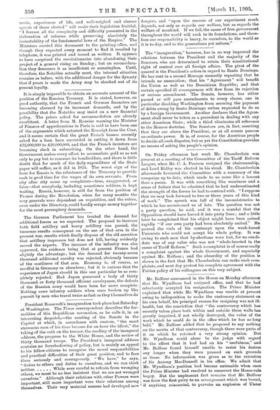President Roosevelt's inauguration took place last Saturday at Washington. The
Times correspondent describes the for- malities of this Republican coronation, as he calls it, in an interesting despatch,—the meeting of the Senate in the Capitol at which, in accordance with custom, " the most strenuous man of his time became for an hour the idlest," the taking of the oath on the terrace, the reading of the inaugural address, the progress to the White House, and the review of thirty thousand troops. The President's inaugural address contains no foreshadowing of policy, but is mainly an appeal to his fellow-citizens to recognise the moral responsibilities and practical difficulties of their great position, and to face them seriously and courageously. " We have," he says, " duties to others and duties to ourselves, and we can shirk neither While ever careful to refrain from wronging others, we must be no less insistent that we are not wronged ourselves." Although their relations with other Powers were important, still more important were their relations among themselves. Their very material suocess had developed new dangers, and " upon the success of our experiment much depends, not only as regards our welfare, but as regards the welfare of mankind. If we fail, the cause of free government throughout the world will rock to its foundations, and there- fore our responsibility is heavy, to ourselves, to the world as it is to-day, and to the generations yet unborn."










































 Previous page
Previous page